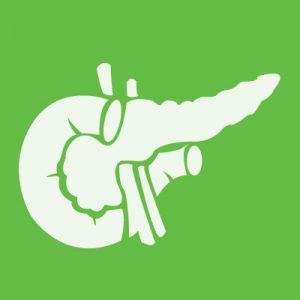Clinician Scientist Dr. Robert Grant will help lead OICR’s signature pancreatic cancer program into next phase.
Dr. Robert Grant recently became Clinical Co-Lead of OICR’s cutting-edge pancreatic cancer research program, PanCuRx, following the retirement of Dr. Steven Gallinger. As a Clinician Investigator at Princess Margaret Cancer Centre (PM), Grant treats patients with pancreatic and biliary tract cancers and conducts research into integrating Big Data and AI technologies into clinical decision making.
Grant works out of the Wallace McCain Centre for Pancreatic Cancer at PM, which collaborates extensively with the PanCuRx program on clinical trials. He joined OICR News for a chat in which he explained his journey from studying economics to testing drugs on patient-cell derived organoids.
Can you tell us about how you became interested in medicine and research and pancreatic cancer in particular?
When I was completing my undergraduate degree in economics and trying to figure out what I wanted to do, I had been volunteering at the cancer centre in London, and it was a really informative experience. It was inspiring to see everyone there working to help people with cancer, and in addition, my grandfather had cancer at the time. I didn’t know much about oncology, but I decided to pivot my studies to try and get into medical school. To get the necessary prerequisites, I pursued my MA in economics and was successfully accepted to medical school at the University of Toronto.
During my first month there, I was connected with Dr. Steven Gallinger. I heard he was doing cool research, in particular exome sequencing, which was a brand new technology. I remember doing a PubMed search for ‘exome’ and there only being 20 or so papers. It was super interesting to me and Steve’s passion for pancreatic cancer research really rubbed off on me. It was the right place, the right time, I liked the new technology that nobody really understood, and I had some statistical background to bring to the table. I really never looked back from there.
How does that background in economics play into your work?
I think in many ways, when I was studying economics, it was at the forefront of Big Data and statistical analysis. A lot of the innovative techniques were coming from the economics world which I found interesting, and now Big Data and its analysis are part of fields like medicine and genomics. Economics provided me with a solid foundation for applying these techniques to pancreatic cancer. In addition, I think there’s a broader way of thinking in economics that has probably stayed with me.
Can you tell us about your work as a clinician-investigator?
As a medical oncologist at the Princess Margaret Cancer Centre, I mostly see people with pancreatic and biliary cancers, many of whom enrol in our innovative clinical trials testing new therapies and other technologies. I also oversee the pancreatic cancer genetics and screening program. Preventing pancreatic cancer remains a central challenge for us, but today, genetics is high impact, since when we find a genetic cause of a pancreatic cancer, we’re able to prevent other cancers throughout a whole family.
This clinical work blends nicely with what our team at PanCuRx does from a research perspective and my personal lab, which is focused primarily on applications of AI and machine learning in the clinic. These applications include integrating different data types such as electronic health records, wearables and genomic data to improve decision making when it comes to treatment and supportive care. For example, in a recent paper in the Journal of Clinical Oncology, we showed how an AI could help get palliative care to those who need it most. In the end, the goal is to improve outcomes and quality of life.
What are the barriers to getting these tools into the clinic?
I think all the ingredients are there, but we haven’t made the meal yet, if that makes sense. The algorithms we have are extraordinarily capable and there’s no doubt in my mind that if applied appropriately to the right situation, that they’d have a major impact. However, data is always an issue. We need to have appropriate safeguards and privacy, but we also need a way to let people who want to contribute their data to AI research do so. By sharing their data, people are helping make these models even more useful. We are making progress in this area, but there is still a lot of work to do.
Also, there is still the question of integrating them into routine clinical practice. We need to map out the complex process of providing pancreatic cancer care and think about the people involved in it. Can we embed these tools into existing practices, or do we need to update our practices more fundamentally? How are we going to measure their impact? Some of these technologies, such as reasoning language models, are poised to have broad impacts on care, so these are the complicated questions we need to be asking. I think that these issues represent the ‘last mile’ to clinical adoption, but I am happy to say that there is a lot of good work going on in this area.
What’s it like being part of PanCuRx and OICR?
I’m really grateful to be a part of this community. OICR has been integral to the success we’ve had so far in our pancreatic cancer research, owing in large part to the Institute being a world-leading genomics powerhouse, thanks to the efforts of Dr. Trevor Pugh and his group, working closely over many years with the co-lead of PanCuRx, Dr. Faiyaz Notta. The technologies available at OICR powered our first wave of discoveries and the new technologies being developed here are allowing us to build upon them and continue to innovate.
In terms of PanCuRx, I am proud of the program’s achievements so far and excited about the foundation they provide our group with going forward. We had the COMPASS trial which proved that you can indeed get rapid high-quality genomic data on a metastatic pancreatic cancer using technologies like whole-genome and transcriptome sequencing and laser capture microdissection, and that this data can improve care. We also have the on-going Prosper-PANC trial which is enabling us to evaluate this approach across Ontario.
Building on the COMPASS trial, we recently completed the PASS-01 trial, led by Dr. Jennifer Knox at the McCain Centre for Pancreatic Cancer with Dr. Elizabeth Jaffee from John Hopkins and Dr. David Tuveson from Cold Spring Harbor. This was an international study that evaluated the two standard forms of chemotherapy for pancreatic cancer in a randomized clinical trial. The results of this trial are allowing us to use biology to help in making the key clinical decision of who should get what treatment. OICR’s sequencing expertise and the other scientific specialties provided by our collaborators really allowed us to dig into this question like never before.
Is there anything going in the program right now that excites you in particular?
It’s the fact that we have really branched out across the spectrum of disease. We are working on tests for early detection, have trials in the surgical and radiotherapy spaces and there continues to be a deep focus on biomarkers to help guide treatment in all of our research. The NeoPancONE trial, which was presented at the American Society of Clinical Oncology conference last month and showed that chemo before surgery is beneficial in some subtypes of pancreatic cancer, is a great example of this.
From a more personal perspective, I am really excited about one trial I am leading from a clinical perspective, called ADOPT. In this trial, we are taking cells from a given patient’s tumour and growing living models of that tumour, called organoids, outside of the body. We will then be able to test many different drugs on them and see which ones the patient’s cancer is sensitive to, including drugs we may not normally use. The science is being led by Faiyaz and his team as part of PanCuRx. We hope that this approach can provide patients with treatment options that they didn’t have before, and on top of that, it will be treatments uniquely suited to their case.
More generally, I see a great momentum in the program and in pancreatic cancer research in general and I am really excited to be a part of it. We have built an amazing team, world-class resources, and capabilities spanning from the bench to the bedside, coordinated by the McCain Centre at PM and PanCuRx at OICR. Together with the incredible opportunities more broadly at OICR, with the network of brilliant people and cutting-edge new technologies, I believe we can use pancreatic cancer as a “launch pad” at OICR and PM, bringing the most exciting innovations rapidly into clinical care to make an impact for this devastating disease.


